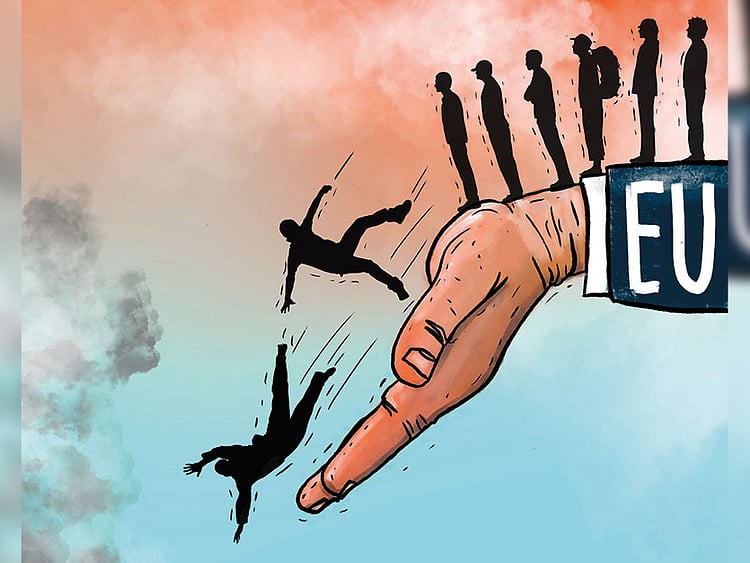‘Some around the world are arguing that human rights are outdated, that national interest can justify the suppression of individual and collective rights,” declared Federica Mogherini, the European Union’s (EU) Foreign Policy Chief, last week at the United Nations General Assembly. “We are here today to state the opposite ... Human rights are real.”
As she said this, there were desperate messages from some of the thousands of refugees in detention centres in Tripoli, after being forced back to Libya under EU policy.
Since August 26, Tripoli has experienced the worst fighting in years, as rival militias fight to take control of the city. As the UN-backed government declared a state of emergency and shells began to fall indiscriminately, refugees and migrants were abandoned or released on to the dangerous streets. Some resorted to drinking toilet water to survive. Others were stuck on front lines, shot at by suspected traffickers, or cowered together as bombs went off beside them.
Using a smartphone shared among hundreds of people, the first group contacted me to appeal for help after one man’s brother found my number online. Since then, many more migrants and refugees have got in touch, describing periods of up to five days without food, sending pictures of men with anti-aircraft missiles driving around outside, or photos showing a newborn baby, whose mother gave birth inside an open hall as the conflict raged on.
“The buildings around us are smoking,” one Eritrean man sent an SOS, as he pleaded for evacuation — something that Medecins Sans Frontieres has repeatedly called for.
Europe’s “stop the boats” policy now resembles Australia’s, as African migrants and refugees are locked up indefinitely after being returned to Libya by the EU-backed Libyan coastguard. They have no recourse to judicial review, instead waiting for help from the UN, while praying not to be sold to traffickers. There are roughly 7,000 people in detention centres, including 640 children, according to the UN.
Many of those currently incarcerated described the moment they came closest to freedom: A point in the Mediterranean when they thought help had come, in the form of Italian boats, only for the boats to block their way.
Physical abuse
Provisional figures released by the Italian Institute for International Political Studies last week show that one in five migrants who tried to escape Libya by sea in September died or disappeared — the highest percentage recorded. Seven in ten were caught and returned by the Libyan coastguard, while only one in 10 made it to Europe. While the EU has been effectively treating Libya as a safe country, despite consistent reports of exploitation, forced labour and physical abuse of returnees, the fighting that broke out in August exposed how untrue this was.
As refugees beg for help, the UN High Commissioner for Refugees (UNHCR) and the International Organisation for Migration say there was nothing they could do while the fighting continued. The refugees have been left on their own to fight for survival. Some have even been forced to become actors in the war, after militias pulled them out of detention centres and made them move heavy weapons or pack bullets, beating those who resisted.
It also became increasingly clear that, in some cases, the messages sent out by the UN seemed to be sugarcoating the reality on the ground. While the UNHCR claimed to have “evacuated” refugees “out of harm’s way” in a statement on August 30, the hundreds who were moved were abandoned in a battleground days later, and starved for even longer than before. In some centres, less than a quarter of the people from refugee-recognised countries say they have been registered with the UNHCR, despite the UN having a mandate to protect them. Some have waited as long as eight months.
Last week, the UNHCR finally admitted that it had no access to the centres and had evacuated most of its own people. “We have less than a handful of international staff that are in the country currently,” Kelly Clements, deputy high commissioner at the UNHCR, told me in New York.
A second ceasefire between Libyan militias was announced last Tuesday, though it remains to be seen if it will hold (a previous ceasefire, agreed on September 4, lasted just a few days).
For the thousands of detainees who have escaped war zones, only to survive abuse by smugglers, the proclamations about human rights by European politicians are total hypocrisy.
— Guardian News & Media Ltd
Sally Hayden is a journalist focusing on migration, conflict, human rights and humanitarian crises.
Sign up for the Daily Briefing
Get the latest news and updates straight to your inbox
Network Links
GN StoreDownload our app
© Al Nisr Publishing LLC 2026. All rights reserved.
